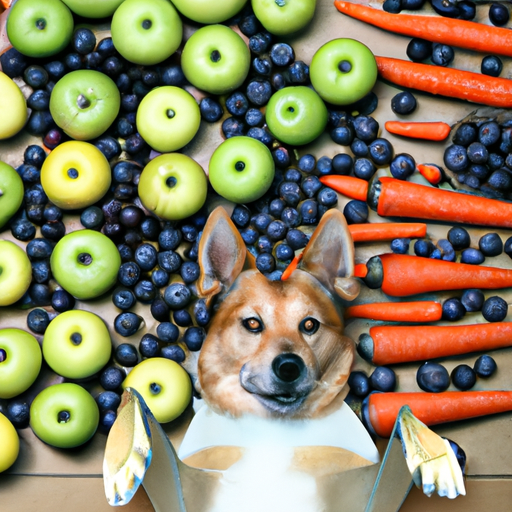Introduction
You’re a caregiver at heart. You look after your loved ones, human or canine, with an unwavering sense of dedication. Like any devoted caregiver, you want to ensure that your dog is getting a well-rounded, nutritious diet. But is it okay for your pup to chow down on the same fruits and veggies you love so much? Let’s dive into this fruity mystery and leafy enigma to find out!
The Good: Fruits and Veggies Dogs Can Safely Enjoy
Fruits and vegetables can be a healthy treat for your furry friends, but not all of them are safe. Here’s a list of ones that get the canine seal of approval:
- Apples: Apples are a great source of vitamins A and C. Just make sure to remove the seeds and core first.
- Blueberries: These little fruits are full of antioxidants, which are good for your dog’s health.
- Carrots: These are low in calories and high in fiber and vitamins.
- Cucumbers: This is a perfect treat for overweight dogs, as they hold little to no carbohydrates, fats or oils.
- Pumpkin: This offers a good dose of fiber and beta carotene, which the body converts into vitamin A.
| Safe Fruits/Veggies | Key Nutrients |
|---|---|
| Apples | Vitamins A and C |
| Blueberries | Antioxidants |
| Carrots | Fiber and Vitamins |
| Cucumbers | Low Carbs, Fats or Oils |
| Pumpkin | Fiber and Beta Carotene |
The Bad: Fruits and Veggies Dogs Should Avoid
Not all fruits and vegetables are created equal in the eyes of our canine companions. Some can be downright dangerous. Here are some you should avoid:
- Grapes and Raisins: These can cause kidney failure in dogs.
- Onions and Garlic: Consuming these can lead to red blood cell damage in dogs.
- Avocado: Avocado contains a substance called persin, which can be toxic to dogs.
- Cherries: Cherries contain cyanide, which is poisonous to dogs.
The Benefits of Fruits and Veggies in a Dog’s Diet
Including fruits and veggies in your dog’s diet can provide a low-fat, healthy alternative to commercial dog treats. They’re packed with vital nutrients and are generally low in calories and fat. Plus, many fruits and vegetables are high in fiber, which can help with your dog’s digestion.
FAQ
Q: Can my dog eat bananas?
A: Yes, bananas are safe for dogs to eat in moderation. They’re high in potassium and vitamins but also sugar, so don’t overdo it.
Q: Is it okay to feed my dog raw vegetables?
A: Yes, most raw vegetables are safe for dogs. However, some dogs may find them hard to digest, so it’s often better to cook them.
Q: How much fruit and vegetables should I give my dog?
A: Fruits and vegetables should not make up more than 10% of your dog’s daily caloric intake.
Q: Are tomatoes safe for dogs?
A: Ripe tomatoes are generally safe for dogs, but green tomatoes or the plant itself can be toxic.
Remember, you’re not just a pet owner. You’re a caregiver, a nurturer. The well-being of your furry friend matters to you more than anything. So, go ahead and share the fruity goodness with your dog, but always remember, moderation is key.



